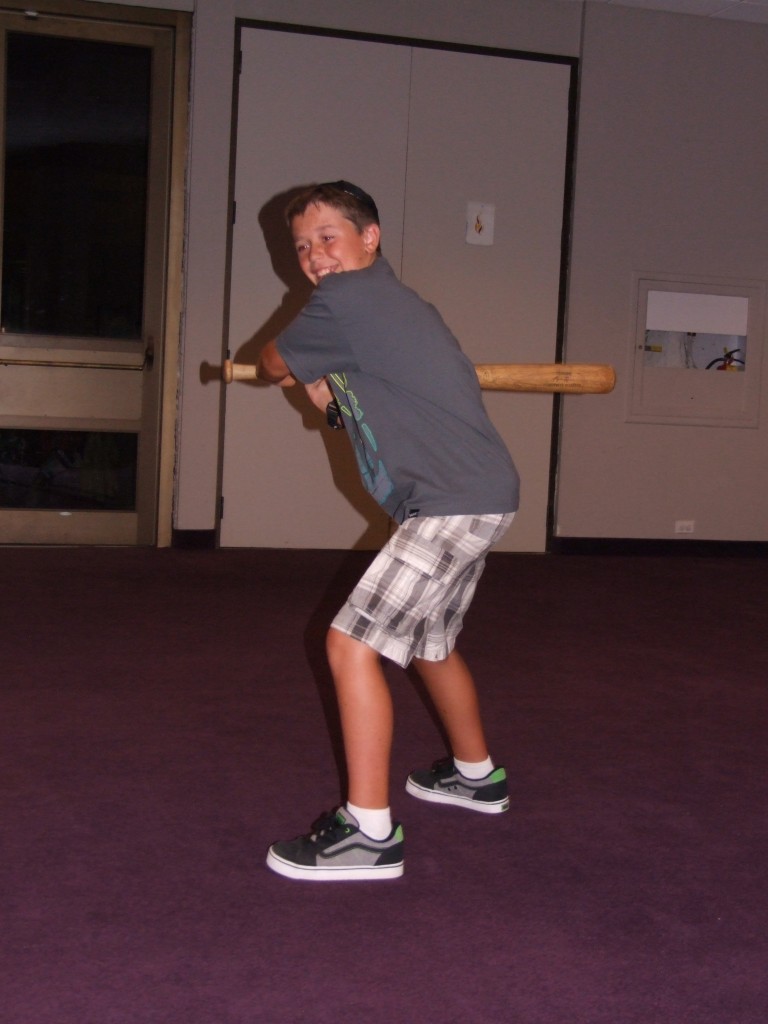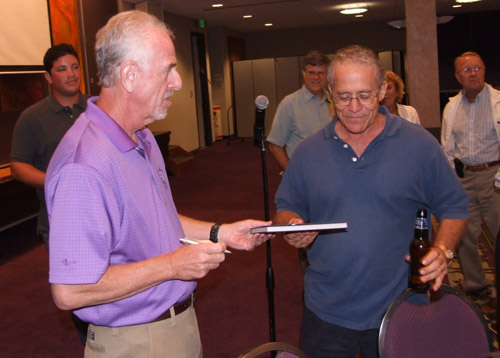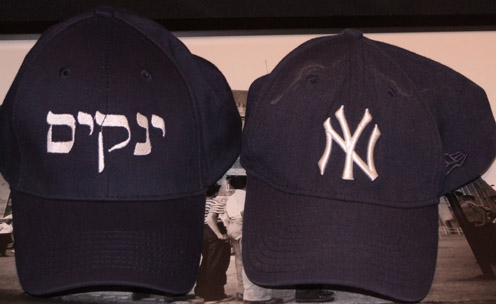
By Donald H. Harrison

SAN DIEGO– It is hard to know whether Cole Thorpe, 11, will ever play professional baseball, or be one of the world’s greatest baseball fans like Andy Strasberg was and is, but there was one thing for certain on Tuesday evening, August 28, as the youngster choked up on a bat once swung by the late Yankee home run king Roger Maris. If only someone had thrown Cole a pitch, any pitch, Cole would have knocked it all the way down the length of the social hall at Tifereth Israel Synagogue.
You could tell, just looking at the determination in Cole’s eyes, that no ball anywhere near the imaginary plate would have a chance to stay anywhere within his make-believe ball park. The expression of resolve you saw in Cole’s eyes was perhaps the same one that Babe Ruth had in 1927 on the day he swatted his 60th home run, or Maris had in 1961 when he hit his 61st, or that Mark McGwire had in 1998 when he hit his 70th, or Barry Bonds had in 2001 when he achieved the current single-season record of 73 round-trippers.
The bat in Cole’s hands had never hit a home run; in fact, it had been cracked during a game in Anaheim in which the visiting New York Yankees faced the California Angels. Maris fouled off the pitch, cracking the bat in the process. There was nothing remarkable about the bat at all, except for the fact that Maris took the trouble to save it and bring it back to Strasberg, his number one fan in New York City.
Strasberg told the Men’s Club of Tifereth Israel Synagogue that he had grown up a few miles from Yankee Stadium at a time when parents hadn’t worried when a kid traveled through the City on his own to see a professional baseball game.

Strasberg’s friends were all Mickey Mantle fans, but Strasberg, then 12, liked Maris from the moment he was traded to the Yankees by the Kansas City Athletics before the 1960 baseball season. Strasberg knew the parking lot where the Yankee players typically parked, and he waited for Maris before every game that he could. For some reason, he was too shy to ask Maris for his autograph, so, instead, he passed notes of admiration to Maris, telling him what a great baseball player he was. This made an impression on Maris, who would reach over the other kids’ hands to take Strasberg’s hand-written epistles.
The year after Maris became baseball’s reigning home run king, Strasberg was sitting in the right field bleachers, behind the position that his hero, #9, Roger Maris, played. During pre-game fielding practice, he finally got the nerve to call from the stands to Maris to please throw him a souvenir baseball. Maris turned around and to Strasberg’s surprise, flipped one to him, over the bleacher fence which was only 4-feet high. Strasberg was so surprised he didn’t catch it. It bounced off him, and another fan got it. He called out to Maris again, pleading for another. Maris whispered something to infielder Phil Linz, who trotted over to the right field stands, and put a ball directly into Strasberg’s hand.
Strasberg exulted to his friends that Maris had given him a ball, but, the truth was, Linz had. That was a season that Strasberg attended 40 Yankee home games. He ventured another request to Maris. Could he someday get one of his home run balls or one of his bats? Maris said the only way he could get a home run ball would be if he caught it himself, but as for the bat, he would see what he could do.

After the Anaheim game, when Maris returned to Yankee Stadium, and saw Strasberg in his accustomed seat , he suggested to the 14 year old that he come to the dugout and pick up the bat. That’s exactly what Strasberg did, stammering to the guard near the dugout entrance that really, Maris has invited him to come. The guard calmed the boy down, and he got the prize possession.
At this point in his lecture, the adult Strasberg walked over to a table and picked up the bat, telling his audience that it was the very one he received on that day a half century before. Just in case anyone was thinking of leaving before the end of his speech (probably nobody was), the bat would be available afterwards for people to heft and to swing. In this dramatic little marketing gesture, we saw the grown up Strasberg, who four years after graduating Akron University, had joined the San Diego Padres organization, eventually rising to the position of vice president of marketing.
But, to get back to his story, while at Akron University in Ohio, he had a poster of Maris in his dorm room. When the news came in 1967 that Maris had been traded to the St. Louis Cardinals, he and his college friends decided that it would be only fitting if Maris’s greatest fan watched Maris in Pittsburgh, Pennsylvania, in a game between the Pirates and the Cardinals.
The college friends drove to Pittsburgh, and Strasberg said he was nervous that Maris would not recognize him out of context. Sure, Maris was used to seeing him at Yankee Stadium, but what would happen at a National League ballpark? However, he needn’t have worried. Maris spotted him and said, “Andy Strasberg? What are you doing in Pittsburgh?” and then Strasberg had the pleasure of introducing his friends to the baseball great.
As he did at Yankee Stadium, Strasberg sat that May 9th in the right field bleachers, in a seat marked Row 9, No. 9, and in that game, Maris “hit his first National League home run,” Strasberg remembered. Pause. “I caught the ball!”
At the end of the inning when Maris returned to his position in right field (which for scoring baseball plays is position number 9), he was amazed when he learned who had bagged him homer. “I don’t believe it!” he told his best fan, now 19 years old.
The following year, 1968, Maris announced he would retire at the end of the season, and Strasberg’s parents — as a birthday present–paid for him to see Maris play the last game of his Major League Baseball career. Strasberg recalled that just before the game was over Cardinals manager Red Schoendienst called time out to let Maris return to the dugout from right field and receive a standing ovation from the fans. Strasberg was 20 at the time. Maris gave some end-of-the career interviews, and in one of them, in The Sporting News, Maris expressed appreciation to his fans, particularly to Strasberg who had come to St. Louis to see him play his last game.
The friendship between Maris and Strasberg continued even after the slugger’s retirement. When Strasberg was hired by the Padres organization, he telephoned the good news to his parents, his future wife and to Roger Maris.
On one occasion, Maris showed up at a hotel in Florida that was hosting a meeting of baseball marketing executives, and retold the story of Strasberg’s homerun catch in Pittsburgh. Maris and Strasberg and their wives, both named Pat, went out to dinner together. At the time, Maris owned a beer distributorship in Gainesville, Florida.
Maris died in December 1985 of Hodgkin’s lymphoma and Strasberg traveled from San Diego to Fargo, North Dakota, in the dead of winter to pay his final respects to his boyhood hero. Introduced by Patricia Maris to hers and Roger’s six children, Strasberg was gratified when Roger Maris Jr. said to him. “I know you, you’re Roger Maris’s number one fan.”
And the story did not end there. During a memorial to Maris to raise money for cancer victims, Strasberg was a speaker. At the dinner, one of the slugger’s sons, Randy Maris, and Strasberg had a lengthy conversation and they decided to keep up the relationship, their families visiting each other and even traveling together.
Then on August 3, 1990, he received a phone call from Randy that he and his wife, Fran, just had a baby boy. They said they planned to name the boy “Andrew” after Strasberg, and asked him to be the boy’s godfather. Of course, he accepted.
In 1996, Strasberg received a telephone call from Ross Greenberg, president of HBO Sports, who asked him if he would be interested in serving as a technical adviser for the movie 61 about the chase that Maris and Mantle made in 1961 to beat Babe Ruth’s record. The movie would be directed by Billy Cyrstal, who was born in 1948, the same year as Strasberg and who was nearly as big a fan.
Strasberg’s responsibility was to sit behind Crystal, to answer any baseball questions.
One day Crystal asked Strasberg if he would like a bit part in the movie, says as an umpire.
No, Strasberg responded, he’d like to portray the fan in street clothes who burst out of the stands to clap Maris on the back as he headed for home plate after bashing that 61st run.
Crystal consented, and in the movie’s credits, it reads: “61st Home Run Fan: Andy Strasberg.”
*
Harrison is editor of San Diego Jewish World. He may be contacted at donald.harrison@sdjewishworld.com
A coworker told me this story at lunch and in joy to my eyes,so I had to read for myself and it had the same effect. Thanks for sharing.
Story’s#1Fan
Wade Martin